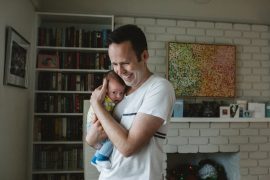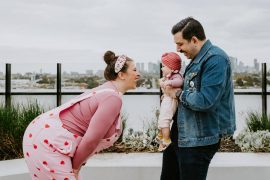4. How does that feel in your body?
Recall the way your body felt during the recent event that set you off. For instance, maybe your child screamed at you and your body cringed. Maybe your child rebuffed your hug and you felt frozen inside. Maybe your child cried and your body mobilised as if it were an emergency, with every nerve taut.
Just notice where you felt discomfort in your body. Breathe into those places.
Notice that as your body feels these sensations, it doesn’t feel safe. You may want to run (flight) or eat something (freeze) or call someone to tell them off (fight). Resist all that. When you want to jump up and check your phone, don’t. When you feel an urgent need to clean the kitchen, don’t.
Just keep breathing. Give yourself a hug and keep noticing the way that sensation feels in your body. As you allow yourself to feel it, the sensation will change.
5. Simply observe
If you can stay in your observer self, it keeps you from getting hijacked by the emotions. When we observe the sensation from the calm, safe perspective of our conscious adult self, it begins to evaporate. The key is helping ourselves feel safe during the discomfort by consciously extending love and compassion to ourselves.
6. Give yourself an antidote
For instance, if you got triggered and screamed in your child’s face, and now you’re remorseful and terrified that you’ve damaged her for life, maybe your antidote is “She’s okay. I can repair this with her. I’m a good parent.” Imagine your child, happily smiling at you. (Your imagination is powerful. You’re programming your subconscious for repair.)
Every time you do this process, you diminish the emotional charge of that trigger. The next time this same old trigger is activated by some new event, you’ll notice that it has less power. Eventually, you’ll be able to stay calm in the face of an event that would once have triggered you.
As you experience these old emotions, you’re calming your reaction to stressors that come up in the present day. You’re also healing the old event that created the trigger. Scientists don’t yet know for sure, but it seems that by deactivating the emotional charge, you allow your brain to finally process the old memory. So if your old trigger was being yelled at by your parent, you may still remember your parent screaming at you, but your takeaway will be that your parent was having a hard time, not that you were unlovable. You’ll feel understanding for your parent, and compassion for yourself as a child, instead of shame. Your takeaway will be an ability to stay more calm when your child is upset.
I think of this as shining the light of consciousness on the memories that we’ve pushed into the dark basements of our psyches. Simply shining our own loving awareness into the shadows melts them away. One by one, we process the memories, remove the charge from the triggers, and they resolve. They no longer pop up to derail us as we go through life.
When we unpack our old baggage like this, we feel so much lighter, happier, less anxious, able to stay calm. And our children don’t have to carry it.
Are all triggers from childhood? No, of course not. Traumas can happen to us throughout life. But the childhood traumas are usually the ones with the most power, because that’s the time when we’re most easily overwhelmed by our emotions. And many of the traumas we experience in later life are re-enactments of our earlier traumas, that we seem to create in the subconscious hope that the’ll give us a chance to heal.
You may be thinking that it will take your entire life to heal your triggers. And you’re right. This is the work of a lifetime. But don’t worry. The good news is that every step you take makes you feel better. Every time you feel those big emotions but resist acting on them by lashing out, you do some healing of that trigger and reduce its power. Over time, those triggers get deactivated.
The even better news is that healing your triggers makes it easier to choose love with your child. And every time you choose love with your child, you touch your child’s heart in a deep way. You strengthen your relationship. Your child gets easier to parent. And you send positive ripples into the world that will play out for generations.
Originally published here.
Dr. Laura Markham is the founder of AhaParenting.com and author of Peaceful Parent, Happy Kids, Peaceful Parent, Happy Siblings and her latest book, the Peaceful Parent, Happy Kids Workbook.










